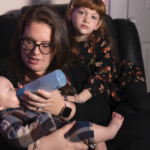Most babies start to show an interest in the world and the people around them at a very young age. By their first birthday, typical toddlers look people in the eye, copy words, play games like peek-a-boo and engage in clapping, waving hello and good-bye, and other simple behaviors.
But for children with Autism Spectrum Disorder, or ASD, the picture is often very different.
According to the Centers for Disease Control and Prevention, people with ASD—which is a complex developmental disability that manifests in many different ways and to many different degrees—may struggle with social, emotional and communication skills.
Children or adults with ASD might:
- not point at objects to show interest (for example, not point at an airplane flying over)
- avoid eye contact and want to be alone
- prefer not to be held or cuddled, or might cuddle only when they want to
- appear to be unaware when people talk to them, but respond to other sounds
- repeat or echo words or phrases said to them, or repeat words or phrases in place of normal language
- have trouble expressing their needs using typical words or motions
- not play “pretend” games (for example, not pretend to “feed” a doll)
- have trouble adapting when a routine changes
- have unusual reactions to the way things smell, taste, look, feel or sound
According to Dr. Sue Cohen, Director of Early Childhood and Psychological Services at North Shore Child & Family Guidance Center, other signs to look for include a child not responding to his or her name when called; repeating actions over and over again; and having highly restricted interests.
“People with ASD may have trouble understanding other people’s feelings or verbalizing their own feelings,” she says. “Their conversations may be focused only on what they are interested in, which can make it difficult for them to make friends. On the other hand, they may be very interested in people, but not know how to talk, play or relate to them. They don’t understand that others might be bored with their topic and it’s time to talk about what somebody else is interested in.”
Early intervention is important, but even with older children, treatment can result in real improvements. The Guidance Center provides thorough testing and, depending on the results, will create a customized therapeutic treatment plan, which often includes social skills groups and play therapy.
Support groups for caregivers are also very helpful. In addition to parent support groups, we have a program called GASAK, which stands for Grandparent Advocates Supporting Autistic Kids.
Also, our staff includes family advocates who often get involved in the cases, helping clients get appropriate services from their schools and other providers.
“It’s very important to determine the child’s needs and come up with a good educational and therapeutic plan,” says Dr. Cohen. Although people with ASD may face challenges, a diagnosis doesn’t mean your child won’t experience feelings of love, bonding and joy, she adds. “The child is still the same loving child they were before the diagnosis. It’s a condition they have, but it doesn’t have to define your child’s life.”
To reach the Guidance Center, call (516) 626-1971.
Sources:
















